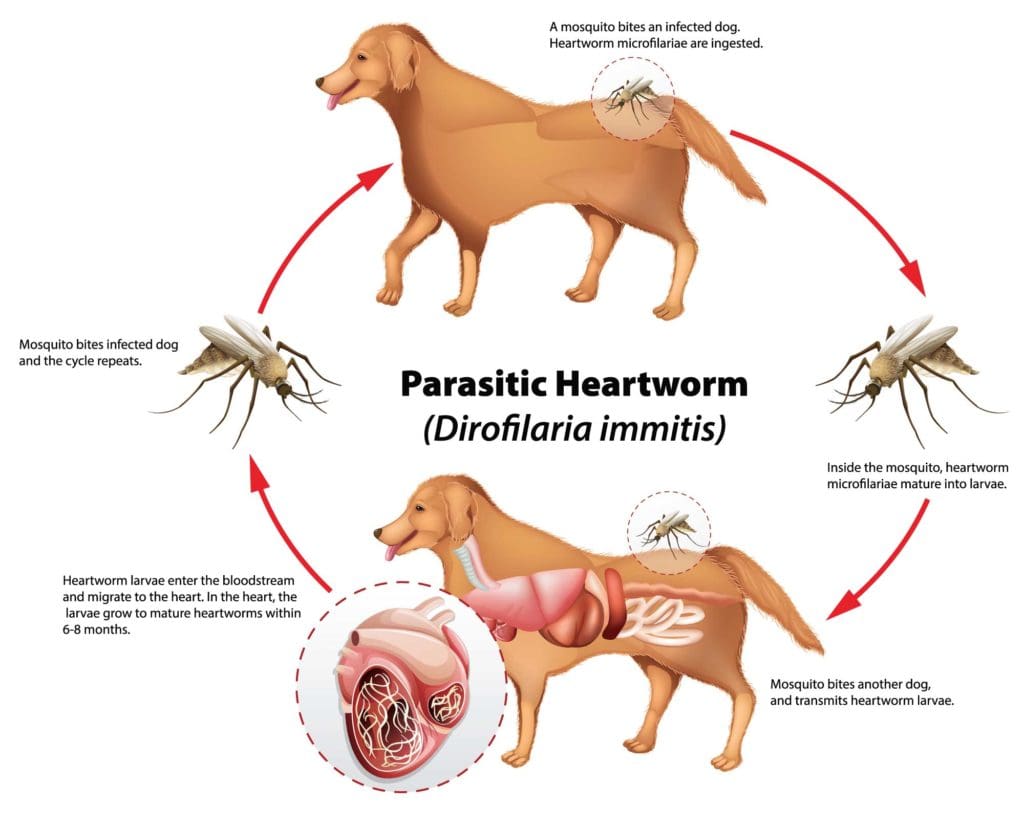Home » Hunting Dogs » Changing The Conversation On Heartworm Disease in Dogs
Changing The Conversation On Heartworm Disease in Dogs

Your dog’s lifestyle and your preventive actions play a role in whether or not your dog is at risk for heartworms
As a veterinarian living and working in Montana, nearly half of my clientele are from a different state. Many of them are seasonal residents, too. Nowadays, it’s rare for a canine to leave the boundaries of its state. Many of my patients are even more traveled than their owners; it’s common for dogs to be purchased in different locations far away from Montana or arrive as shelter pets with unknown pasts.
Listen to more articles on Apple | Google | Spotify | Audible
“Does my dog need heartworm prevention here?” is one of the main questions I get from folks who move to Montana. With warming temperatures, people relocating for various reasons, and other folks traveling worldwide, we need to modernize the questions we ask about heartworm disease. The adventures your dog goes on and how they socialize is a much better way to look at heartworm prevention needs than by simply the dog’s home address.
What are heartworms?
Heartworm disease is caused by a parasite called Dirofilaria immitis. They’re called heartworms because the worms are typically found in infected animals’ heart, lungs, and blood vessels. Commonly found in dogs and cats, our pets serve as hosts for the worms to mature, breed, and multiply. When mature, the worms look like long strands of spaghetti. Female worms can be 10 to 12 inches in length, and male worms are a little shorter, averaging four to six inches long. Heartworms can cause lung disease, heart failure, and organ damage in dogs.

Where can heartworms survive?
Heartworm disease is happy anywhere. It only takes one mosquito bite to be infected. After being passed from an infected mosquito to a dog, the worm larvae transfer into the dog’s bloodstream and being to mature into adult worms. It can take about six to seven months for the worms to mature.
Once nestled into a dog’s heart, heartworms can live and thrive wherever that dog may go. From Antarctica to Brisbane, once a dog has heartworm disease, it doesn’t matter where the dog lives. Heartworms don’t care.
Although heartworm disease may struggle to thrive in the wild in Montana or other cold climates, it doesn’t mean it can’t find a good foothold at a local dog park or boarding facility if the temperature is right. Mosquitoes aren’t known for having extensive flight radiuses, and as the host and vector for heartworm disease, that’s an important detail. Mosquitos living in places frequented by dogs means those mosquitoes come in contact with potentially infected dogs regularly. The risk of heartworm infection and other disease transmission increases if your dog goes to training facilities, boarding facilities, participates in hunt trials, or any other activity where many other dogs are present.
There’s a widely held belief that the harshness of your winters decreases your risk of heartworm disease. And although this may be true for the winter months themselves, it does not mean that heartworms can’t thrive once the weather warms up. Heartworm disease has been recognized in every state, and some states known for brutal winters have exceptionally high heartworm rates during the warmer months.
Why should I test my dog for heartworms?
Most dogs infected with heartworm disease will not show any symptoms for several months or even years. Heartworms also have similar lifespans to dogs themselves. This means that seemingly healthy dogs can be infected with heartworms and potentially sharing their disease with other dogs.
Heartworms silently cause marked changes to the heart and vasculature. Most people are under the impression their dog will show symptoms of heartworm disease. Eventually, they will, but by that point, the worms have caused permanent heart damage. This is why it is important to test dogs annually so that early-stage infections can be caught and treatment instituted before permanent heart damage is created.
Dogs that do show symtoms of heartworms may cough, be reluctant to exercise, be fatigued after moderate exercise, experience a decrease in appetite, and lose weight. As the disease worsens, dogs may develop heart failure or have a swollen belly. The swelling is a result of excess fluid in their abdomen.
Heartworm Symptoms List
- Fatigue
- Decreased Appetite
- Loss of Weight
- Swollen Belly
Most cases of heartworm disease are caught due to prophylactic screening, or preventative screening. Many veterinarians now utilize heartworm tests that also look for common tick diseases, such as Lyme disease, making the benefit of this test even greater. If your dog does test positive for heartworms, treatment is available.
How can I treat my dog for heartworms?
Luckily, there are several heartworm prevention options that are also very good dewormers. Most preventatives are oral monthly prescriptions. Injectable, long-lasting prevention is also an option. The injectable version is performed by veterinarians and can last anywhere from six to 12 months. However, this option does not cover tapeworms, so that should be considered when deciding which preventative your dog needs.
Make sure your heartworm preventative matches your dog’s lifestyle
In Montana, the heartworm risk remains relatively low, though our level of infections increases with every passing year. Ensuring your pet is on preventatives that match its lifestyle and not just your address is critical. Next time you visit your veterinarian, don’t ask if your state has heartworm disease (it does). Instead, take the opportunity to discuss your pet’s lifestyle, travel history, and activity plans so your veterinarian can build a safe and robust heartworm preventative plan for your hunting companion.



